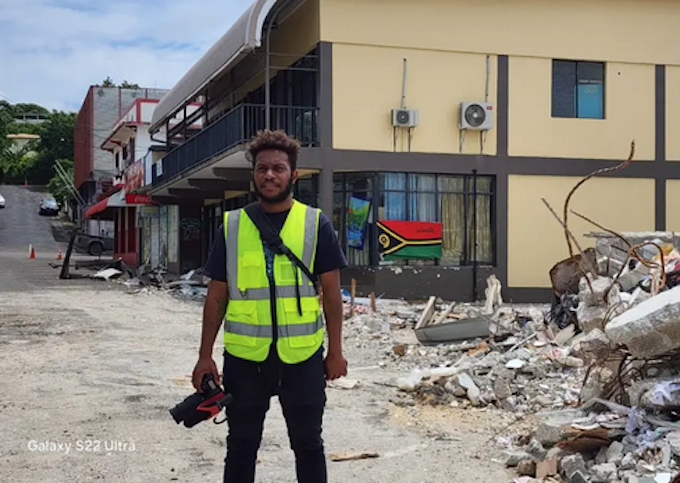
By Lagipoiva Cherelle Jackson
For Doddy Morris, a journalist with the Vanuatu Daily Post, the 7.3 magnitude earthquake that struck Vanuatu last month on December 17, 2024, was more than just a story — it was a personal tragedy.
Amid the chaos, Morris learned his brother, an Anglican priest, had died.
“My mom called me crying and asked, ‘Did your brother die?’. I wasn’t sure and told her I was heading to Vila Central Hospital right away,” he recalled.
- READ MORE: Vanuatu election 2025: Earthquake aftershocks expose high cost of democracy
- Other Vanuatu earthquake reports
Morris arrived at the hospital to confirm the worst. “My heart sank when I confirmed that my brother had indeed passed away. At that moment, I forgot about my job.”

Despite his grief, Morris joined his remaining brothers at the hospital mortuary that night, staying by their deceased sibling’s side and mourning together. “We were the only ones there. We spent the whole night drinking kava outside while he lay in the cool room,” he said.
The quake — which claimed 14 lives, injured more than 265 people, and displaced more than 1000 — left an indelible mark on Port Vila and its residents. Infrastructure damage was extensive, with schools, homes, and water reserves destroyed, and the Central Business District (CBD) heavily impacted.
In the days following the earthquake, Morris returned to his role as a reporter, capturing the unfolding crisis despite the emotional toll. “When the earthquake struck, I thought I was going to die myself,” he said. Yet, minutes after the tremor subsided, he grabbed his camera and rushed to the CBD.
At the heart of the destruction, he witnessed harrowing scenes. “I was shocked to see the collapsed Billabong building. A body lay covered with a blue tarpaulin, and Pro Rescue teams were trying to save others who were trapped inside,” Morris recounted.
The lack of a network connection frustrated his efforts to report live, but he pressed on, documenting the damage.
A month after the disaster, Morris continues to cover the aftermath as Vanuatu transitions from emergency response to recovery. “A month has passed since the earthquake, but the memories remain fresh. We don’t know when Port Vila will return to normal,” he said.
His photojournalism has been demonstrating the true impact of the earthquake as he continues to capture the mourning of a nation after such a tragic event.

The earthquake left deep scars, not only on the nation’s infrastructure but also on its people. “Unlike cyclones, which we can predict, prepare for, and survive, earthquakes strike without warning and show no mercy,” Morris said.
Through grief and uncertainty, Morris remains committed to his work, documenting the resilience of his community and the challenges they face as they rebuild. His reporting serves as a testament to the strength of both the people of Vanuatu and a journalist who continues to bear witness, even in the face of personal loss.

Reporting on his own community while grappling with personal loss is a reality for many Pacific Island journalists who cover disasters. For Doddy Morris, reporting on the traumatic events of the earthquake meant confronting his own grief while documenting the grief of others.
Dr Lagipoiva Cherelle Jackson is a Pacific journalism trainer with the Dart Center for Journalism and Trauma. She expresses her support for Morris and his colleagues in showing “extraordinary courage and resilience”. This article was first published by The New Atoll and is republished with permission.











































